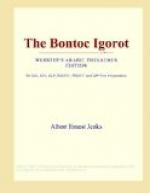A child usually receives its first personal name between the years of 2 and 5. This first name is always that of some dead ancestor, usually only two or three generations past. The reason for this is the belief that the anito of the ancestor cares for and protects its descendants when they are abroad. If the name a child bears is that of a dead ancestor it will receive the protection of the anito of the ancestor; if the child does not prosper or has accidents or ill health, the parents will seek a more careful or more benevolent protector in the anito of some other ancestor whose name is given the child.
To illustrate this changing of names: A boy in Tukukan, two hours from Bontoc, was first named Sa-pang’ when less than a year old. At the end of a year the paternal grandfather, An-ti’-ko, died in Tukukan, and the babe was named An-ti’-ko. In a few years the boy’s father died, and the mother married a man in Bontoc, the home of her childhood. She moved to Bontoc with her boy, and then changed his name to Fa-li-kao’, her dead father’s name. The reason for this last change was because the anito of An-ti’-ko, always in or about Tukukan, could not care for the child in Bontoc, whereas the anito of Fa-li-kao’ in Bontoc could do so.
The selection of the names of ancestors is shown by the following generations:
1. Mang-i-lot’
2. Cho-kas’
3.
Kom-ling’
4.
Mang-i-lot’
5
A. Kom-ling’
5
B. Ta-kay’-yeng
5
C. Teng-ab’
5
D. Ka-weng’
Mang-i-lot’ (4) is the baby name of an old man now about 60 years old; it was the name of his great-grandfather (1). Numbers 5 A, 5 B, 5 C, and 5 D are the sons of Mang-i-lot’ (4), all of whom died before receiving a second name. The child Kom-ling’ (5 a) was given the name of his paternal grandfather (3). Ta-kay’-yeng (5 B) bears the name of his maternal great-grandfather. Teng-ab’ (5 C) and Ka-weng’ (5 D) both bear the names of uncles, brothers of the boy’s mother. The present name of Mang-i-lot’ (4) is O-lu-wan’; this is the name of a man at Barlig whose head was the first one taken by Mang-i-lot’. A man may change his name each time he takes a head, though it is not customary to do so more than once or twice.
Girls as well as boys may receive during childhood two or three names, that they may receive the protection of an anito. In Igorot names there is no vestige of a kinship group tracing relation through either the paternal or maternal line.
The people are generally reticent about telling their names; and when they do tell, the name given is usually the one borne in childhood; an old man will generally answer " am-a’-ma,” meaning simply “old man.”
Circumcision
Most boys are circumcised at from 4 to 7 years of age. The act of circumcision, called “sig-i-at’,” occurs privately without feasting or rite. The only formality is the payment of a few leaves of tobacco to the man who performs the operation. There are one or two old men in each ato who understand circumcision, but there is no cult for its performance or perpetuation.




